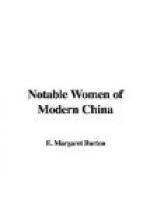Mrs. Ahok proved to be as active a worker as was her husband. When she had been a Christian only a very short time, the leader for the Friday night meeting held in their home failed to arrive. Evidently her husband was away on one of his business trips, for there was no one else there who could take charge of the service. So Mrs. Ahok said, “I will lead it, though I am not very well instructed in the doctrines of Christianity.” In telling of it afterward she said: “I read about the woman who lost the piece of money and took a candle and searched for it; and about the sheep that was lost and found; and then there was singing and prayer; and I spoke to them, and I was able to speak a great deal for them to hear. God helped me and blessed me greatly in the service.”
Soon after she had become a Christian she wrote a letter to the Woman’s Foreign Missionary Society of the Methodist Church, to be read at their annual meeting. In it she says: “The time for your meeting is so near that thoughts of it are constantly in my heart.... We have meetings in our hong (store), and also meetings in our house every Friday evening. The praise for leading us to know the doctrine, and open the meetings, is all due to the sisters who have not minded that the road to China led them so away from their own country, but have come to teach us of Christianity. Although I do not presume to say that my heart has been deeply sown with gospel seed, yet I know that it has been changed into a different heart.... Now I send you this letter of greeting, thanking you for your favours, and praising you for your great virtues. May God bless your fervour and spread abroad the doctrine of Christianity in my country. This is what I always pray.”
II
WORK AMONG THE WOMEN OF THE UPPER CLASSES
Interested in every form of Christian service, Mrs. Ahok was especially eager to share the joy of her new-found faith with the women of her own class, the wealthy aristocratic ladies whose secluded lives were so barren and empty, and to whom it was so difficult for a missionary to obtain access. She threw herself with whole-hearted eagerness into the work of the Church of England Zenana Society, whose mission is to these very women, and many are the testimonies to the inestimable value of the work which she did. As one of the missionaries wrote: “She is of immense usefulness in getting the houses open, as she knows the high-class families, and is intensely earnest herself that her fellow-countrywomen should receive the glad news too. Her knowledge of the endless Chinese etiquette and customs, too, is of great service.” How difficult it would have been to carry on work of this kind successfully without the help of a Chinese lady of the “four hundred,” can be judged from the accounts of the work which the missionaries wrote home from time to time.
[Illustration: Reception Rooms in Chinese Homes of Wealth]




